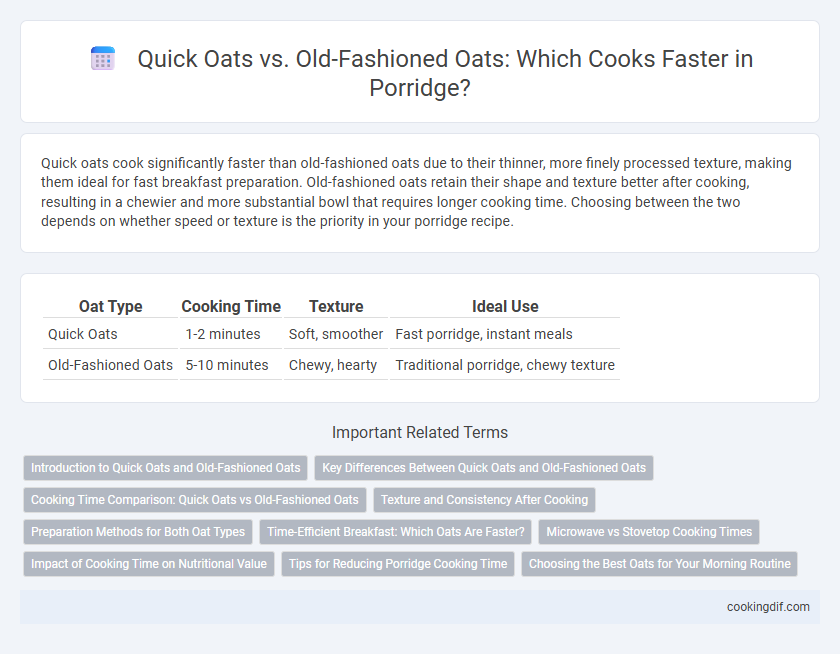Quick oats cook significantly faster than old-fashioned oats due to their thinner, more finely processed texture, making them ideal for fast breakfast preparation. Old-fashioned oats retain their shape and texture better after cooking, resulting in a chewier and more substantial bowl that requires longer cooking time. Choosing between the two depends on whether speed or texture is the priority in your porridge recipe.
Table of Comparison
| Oat Type | Cooking Time | Texture | Ideal Use |
|---|---|---|---|
| Quick Oats | 1-2 minutes | Soft, smoother | Fast porridge, instant meals |
| Old-Fashioned Oats | 5-10 minutes | Chewy, hearty | Traditional porridge, chewy texture |
Introduction to Quick Oats and Old-Fashioned Oats
Quick oats are oat groats that have been steamed and rolled thinner than old-fashioned oats, allowing them to cook in about 1 to 2 minutes. Old-fashioned oats, also called rolled oats, are steamed and rolled thicker, requiring around 5 to 10 minutes to cook. The thinner texture of quick oats makes them ideal for faster porridge preparation, while old-fashioned oats provide a chewier texture and richer flavor with longer cooking time.
Key Differences Between Quick Oats and Old-Fashioned Oats
Quick oats cook in about 1 to 3 minutes due to their thinner, more processed flakes, making them ideal for fast meal preparation. Old-fashioned oats require 5 to 7 minutes of cooking time, as their thicker, less processed flakes retain more texture and chewiness. The difference in cooking time directly impacts the porridge's final consistency and nutritional profile, with old-fashioned oats offering a heartier texture and slower digestion.
Cooking Time Comparison: Quick Oats vs Old-Fashioned Oats
Quick oats typically cook in about 1 to 3 minutes, making them ideal for fast meals, while old-fashioned oats require 5 to 10 minutes to achieve a chewy texture. The thinner, smaller pieces of quick oats absorb water rapidly, resulting in a softer consistency compared to the denser, flatter flakes of old-fashioned oats. Choosing between the two depends on desired texture and available preparation time, with quick oats favored for speed and old-fashioned oats for a heartier bite.
Texture and Consistency After Cooking
Quick oats have a finer texture and cook in about 1 to 2 minutes, resulting in a creamier, softer porridge with a smoother consistency. Old-fashioned oats take around 5 to 10 minutes to cook and retain more of their shape, providing a chewier texture and thicker, heartier consistency. Choosing between them depends on whether you prefer a speedy, silky porridge or a more substantial, textured bowl.
Preparation Methods for Both Oat Types
Quick oats cook significantly faster than old-fashioned oats due to their finer texture and thinner flakes, typically requiring only 1 to 3 minutes of cooking time. Old-fashioned oats maintain their structure during cooking and usually need 5 to 10 minutes of simmering to achieve a creamy porridge consistency. Soaking old-fashioned oats overnight can also reduce cooking time and enhance texture, making preparation methods a key factor in choosing between oat types for porridge.
Time-Efficient Breakfast: Which Oats Are Faster?
Quick oats cook in about 1 to 3 minutes, making them the ideal choice for a time-efficient breakfast compared to old-fashioned oats, which require 5 to 10 minutes to cook. The thinner, pre-steamed flakes of quick oats absorb liquid faster, reducing overall preparation time. Choosing quick oats helps streamline morning routines without sacrificing nutritional benefits.
Microwave vs Stovetop Cooking Times
Quick oats cook significantly faster than old-fashioned oats, taking about 1 to 2 minutes in the microwave compared to 3 to 5 minutes for old-fashioned oats. On the stovetop, quick oats require around 1 to 3 minutes of cooking, while old-fashioned oats need 5 to 10 minutes to reach a creamy texture. Microwave cooking enhances speed for both types, but old-fashioned oats maintain a chewier texture due to longer stovetop cooking times.
Impact of Cooking Time on Nutritional Value
Quick oats cook within 1 to 2 minutes, while old-fashioned oats require about 5 to 10 minutes, with longer cooking times slightly reducing water-soluble vitamins like B-complex and antioxidants. Despite this, both oat types retain substantial amounts of fiber, protein, and essential minerals such as iron and magnesium after cooking. Choosing old-fashioned oats maximizes nutrient preservation with minimal nutrient degradation due to gentler, slower heat exposure.
Tips for Reducing Porridge Cooking Time
Quick oats cook significantly faster than old-fashioned oats, typically requiring just 1 to 3 minutes, while old-fashioned oats take about 5 to 10 minutes. To reduce porridge cooking time, use quick oats or pre-soak old-fashioned oats in water or milk for at least 30 minutes to soften them. Stirring constantly and using higher heat initially can also speed up the cooking process without compromising texture.
Choosing the Best Oats for Your Morning Routine
Quick oats cook in about 1 to 2 minutes, making them ideal for busy mornings, while old-fashioned oats require approximately 5 minutes due to their thicker, less processed flakes. Choosing old-fashioned oats provides a chewier texture and more retained nutrients, favored in recipes needing longer cooking times or added texture. For a balance of speed and nutrition, quick oats suit instant porridge preparation, whereas old-fashioned oats are better for slow-cooked, hearty breakfasts.
Quick oats vs old-fashioned oats for cooking time Infographic

 cookingdif.com
cookingdif.com